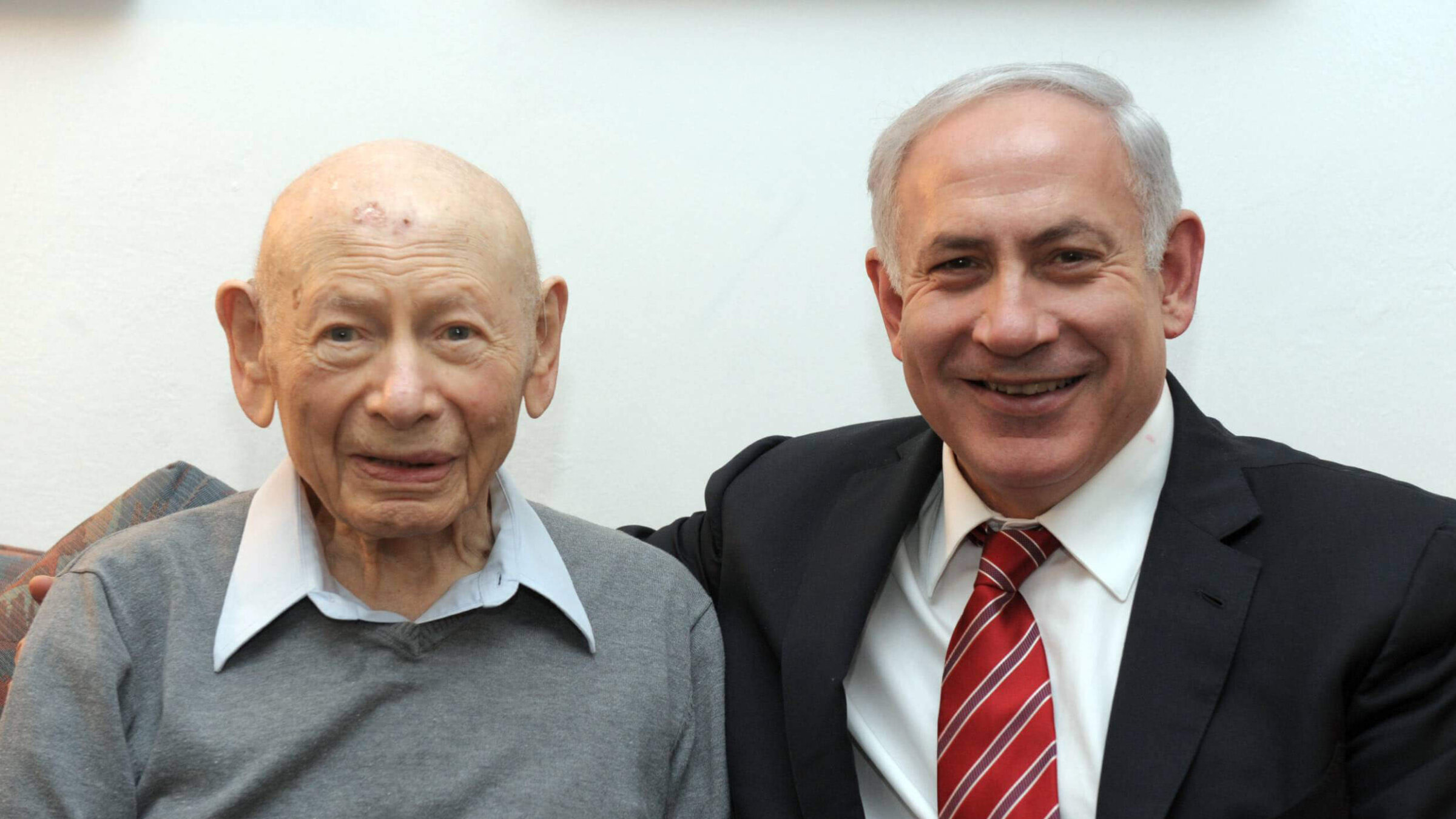A Pulitzer-winning novel drops the Netanyahus in an American college town
Joshua Cohen’s 2021 novel won the 2022 Pulitzer for Fiction.

Benjamin Netanyahu (R) sits with his father, Professor Benzion Netanyahu, on March 25, 2012. Photo by Getty Images
“The Netanyahus” won the 2022 Pulitzer Prize for Fiction. In honor of the occasion, we’re republishing our review, which called the book “masterfully clever and funny.”
Read this article in Yiddish
By Joshua Cohen
New York Review Books, 240 pages
Joshua Cohen’s latest novel takes place in a college town in upstate New York in the winter of 1960. The narrator, Ruben Blum, is a young professor of American history who’s been selected as a member of a hiring committee to appoint a new professor for the history department. This is supposed to be simply part of his job, but there seems to be something odd about it.
Eventually, Blum realizes what it is: apparently, he was selected not for his scholarly expertise, but because he is the college’s only Jewish professor. The candidate for the new position is none other than Benzion Netanyahu, the well-known (and non-fictional) expert on the Spanish Inquisition. Besides being a historian, Netanyahu is a right-wing Zionist activist who once worked closely with the intellectual leader of Revisionist Zionism, Ze’ev Jabotinski.
Netanyahu’s history writing leans Revisionist as well. He argues that the true goal of the Spanish government was not to facilitate the conversion of the Jews, but rather to expel the converted Jews from the Catholic Church. According to Netanyahu, Jews in medieval Spain were eager to assimilate and were converted of their own free will. But Inquisition leaders considered the converts a danger to the state and persecuted them, eventually leading to the expulsion of the Jews from Spain. For Netanyahu, this event was an example of the perennial antisemitism among the Gentile nations. The moral of the story was simple: As much as Jews might try to assimilate and imitate their Gentile neighbors, it wouldn’t do them any good; they would eventually be rejected and expelled anyway.
The novel seems to imply that there are elements of this rejection of the Jews here in the United States, too. True, Blum is happy with his life, his family, his home and his academic position, all of which represents a significant improvement over his parents, poor immigrants from Eastern Europe. He believes in the American ideals of democracy, justice and progress. If he does occasionally feel uncomfortable with his Christian colleagues who tend to make him feel like an outsider, this discomfort is merely a trifle compared to the fate of the Jews of Europe.
One snowy day in January, Benzion Netanyahu shows up at Blum’s doorstep with his entire family: his wife, Tzila, and their three sons: the eldest, Yoni (Jonathan), the middle son, Bibi (Benjamin) and the youngest, Iddo. They’re tired, cranky and rude — and that’s just the start of Blum’s troubles. Everything that can go wrong with Netanyahu’s visit does, and it ends with a tremendous scandal.
The novel presents Blum as a naive American liberal and satirizes the Netanyahus, with their penchant for provocation, manipulation and conflict — qualities that Benjamin Netanyahu seems to have inherited. In an afterword, Cohen writes that the idea for the novel came to him from a story he once heard from the eminent literary scholar, Harold Bloom, who passed away in 2019. As a young man, Cohen was a frequent guest at Bloom’s home, where he heard all sorts of curious tidbits about well-known people.
One story Bloom told concerned his encounter with Benzion Netanyahu, whom he had first met at Cornell University. Cohen cautions the reader that Harold Bloom was not meant to be the prototype for his hero, Ruben Blum. There’s no doubt, though, that the Netanyahus in the book are indeed parodies of the Israeli prime minister’s family.
The war of ideas between the radical Zionist, Benzion Netanyahu, and the American liberal, Ruben Blum, continues the theme of Cohen’s previous novel, “Moving Kings”: the conflict between two alternative Jewish world views, the Israeli perspective and the American one. The first, represented by Benzion Netanyahu, sees all of Jewish history as an unbroken chain of repeated persecutions ever since the Exodus from Egypt. The only way out of the vicious circle is to build a Jewish state.
Blum, representing the American perspective, believes that the gradual progress of humanity, with America leading the way, is good for the Jews. Today Blum may appear like a naive liberal of the older generation, believing in the ideals of an America that no longer exists. The Netanyahus, on the other hand, represent a radical Zionism that aims to extricate the Jews from their long Diaspora history. Yet, their behavior is chaotic and dangerous and potentially self-destructive. In a masterfully clever and funny way, Cohen lets the war of ideas play out on the page, exposing the fallacies of both perspectives. The readers may decide which side is right, but in the end, the dispute remains far from resolved.
A message from our Publisher & CEO Rachel Fishman Feddersen

I hope you appreciated this article. Before you go, I’d like to ask you to please support the Forward’s award-winning, nonprofit journalism so that we can be prepared for whatever news 2025 brings.
At a time when other newsrooms are closing or cutting back, the Forward has removed its paywall and invested additional resources to report on the ground from Israel and around the U.S. on the impact of the war, rising antisemitism and polarized discourse.
Readers like you make it all possible. Support our work by becoming a Forward Member and connect with our journalism and your community.
— Rachel Fishman Feddersen, Publisher and CEO






























